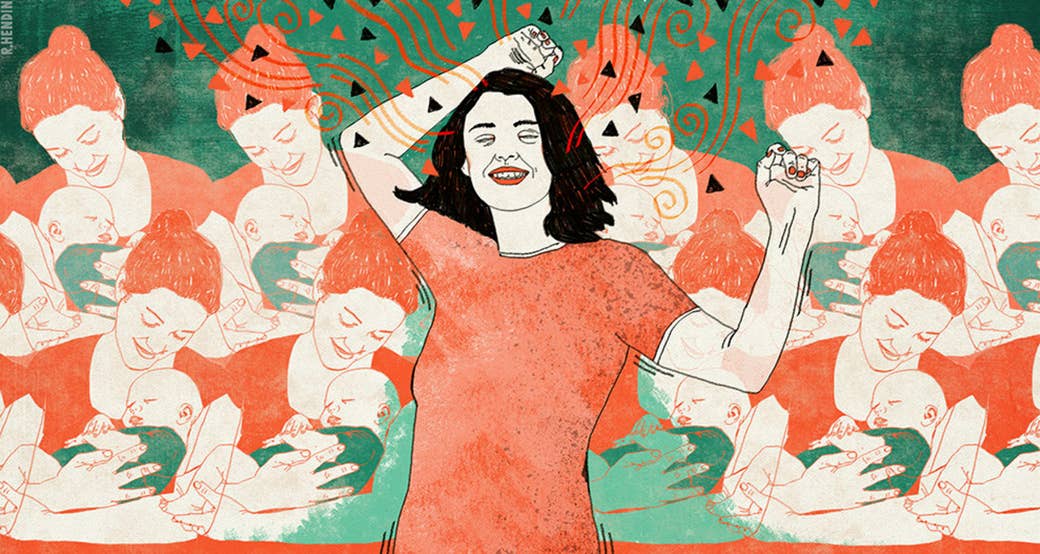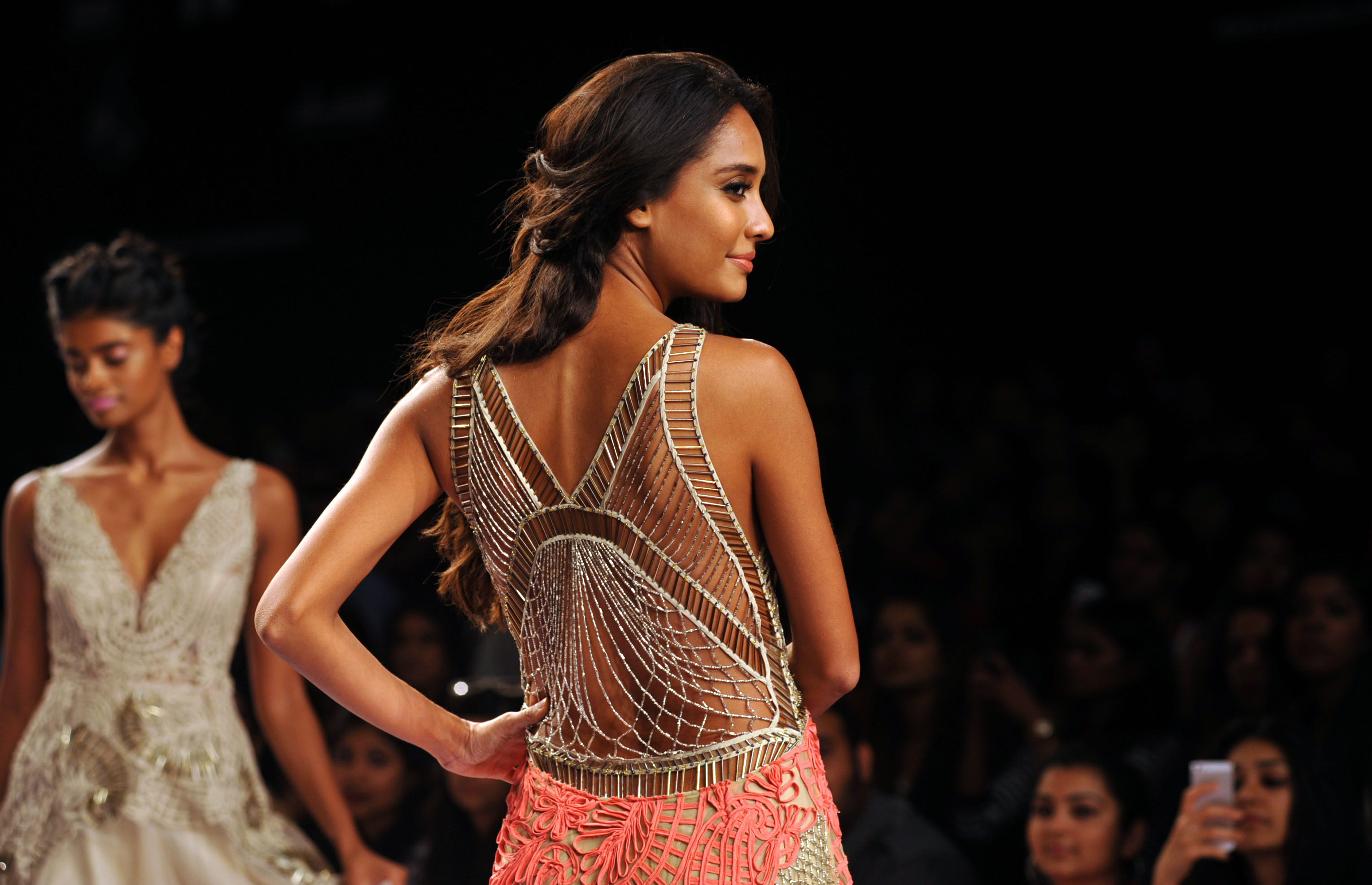
When I got pregnant with my first child, I wondered if I'd failed as a feminist.
I was 28 and leading a life I wanted. I was married, and my body wanted to get pregnant, so I got pregnant. It was that simple. I didn’t think as much about parenting as I thought about answering my body’s need to nurture a baby.
I thought of myself as a progressive, intelligent, independent city woman, fairly well read in feminist theory. I worked hard and cared about my career. I enjoyed the free time I had for creative pursuits. Motherhood was, I suddenly feared, the death knell of these identities to some extent.
Now that I was having kids, did I have to regretfully hang up my “feminist” tag?
What can any self-respecting feminist get done, I asked myself even while enjoying my pregnancy, when she’s spending all her time changing nappies?
“Good” motherhood, according to the ads, movies, and examples around me, entailed automatic selflessness – letting your own ambitions take a back seat, devoting every hour of every day, instead, to the ambitions of your husband and kids.
Even as my mother raised me, saying constantly that "there's nothing in the world you can't do," I watched her be my mother first and foremost. (I know now from raising two myself: Children learn more from how you live than what you tell them is true.)
When I heard my fetus’s heartbeat for the first time, the terror of losing one identity went to war with the joys of creating another.
Is this it, I wondered? The venerable “ma ka pyaar”? The revered, sacred maternal instinct that would sanctify me as a good mother? And if so, would it also relegate me to being a "bad feminist"?
In other words: I was confused. Now that I was having kids, did I have to regretfully hang up my “feminist” tag and resign myself to… Well, what exactly?

“Feminism is just an overused term,” model and actress Lisa Haydon said in an interview last week. “Women have been given these bodies to produce children... I don’t want to be a man. One day I look forward to making dinner for my husband and children. I don’t want to be a career feminist.”
Though none of us should still be surprised by Bollywood stars butchering the definition of feminism, I went into a deep spiral of sighing surrender. Feminism deniers wound me deeply. What is a career feminist? Does it pay well? Where do I sign up?
After Haydon’s comments drew the internet’s ire, she doubled-down in a now-deleted Instagram caption yesterday:
It’s important not forget that we are women made for the greatest role ever – bringing life into this world. And that is something to be proud of! Our true power lies in a gift we’ve been given that men will never have. Our bodies create life. If feminists have a problem with this, feminism is not their real issue… Nature is!
Lisa Haydon, I get it. You’re wrong. But I get it.
What Haydon is doing wrong now, and what I did at 28, is mistaking cultural messaging about maternity for “nature”.
What I demanded of myself in motherhood was always someone else’s idea of it.
Years earlier, before I even knew I wanted a baby, I had read Adrienne Rich’s Of Woman Born: Motherhood as Institution and Experience. Early in this landmark book, published in 1976 (I mention the date because everything in it still holds true), Rich says,
Institutionalised motherhood demands of women maternal ‘instinct’ rather than intelligence, selflessness rather than self-realisation, relation to others rather than the creation of self. Motherhood is “sacred” as long as its offspring are legitimate.
During my first pregnancy, going back to Rich helped me realise that what I demanded of myself in motherhood was always someone else’s idea of it.
Like Lisa Haydon, I had learned a lot of what I know about “motherhood” from the narratives, imagery, and cultural mindsets I grew up surrounded by.
With Rich's book, I began, instead, to observe my own experience.
Now, I’m a single mother of a 6-year-old boy and a 7-year-old girl. I am their central role model. It’s debatable if I’m an ideal one, but at the very least, I try.
Regardless of what the ads and the movies tell us, my children see me do the “man work” as well as the “woman work” and hopefully they’re internalising that nobody cares if you’re a man or a woman as long as the work gets done.
Equity is actually a simple enough concept for a 7-year-old to surmise.
Carry a deeply sleeping 30kg child up two flights of stairs? I’m your woman. Cook a loving, goofy Sunday breakfast? Yessiree. Cuss on the road because someone cut us off dangerously? I’m here.
When my son was 2½, he wanted to wear his sister’s pink dress to a birthday party. I let him. He’s 6 now and is developing a sense of style, albeit a subtle one.
It’s clear from his small collection of “girls” clothing that he believes in a world where gender binaries don’t dictate how we can and cannot physically express ourselves.
What he already understands better than most adults: How someone else feels comfortable presenting themselves is none of your business.
My 7-year-old daughter, trying to understand her role in the world, asks me at least once a day what the limits are.
“Are there women auto drivers?”
“Are there women fighters?”
“Are there women police?”
If she sees a bunch of men doing something, like playing football, I find myself googling a women's football match for her to get a glimpse.
Recently, one day at school, a little boy pushed her aside as she began her way to the top-most branches of a tree.
“Only boys climb trees,” he told her. That evening, she came to me to confirm the news.
“Well, what do you need for climbing trees?” I asked.
“Strong hands and legs,” she said.
“And you have them?”
“Yes.”
I don't usually need to say much more. Equity is actually a simple enough concept for a 7-year-old to surmise.
At the end of the day, feminist mothers raise better children.
Lisa Haydon and I both enjoy several freedoms that feminism has won us. Her Instagram gives us glimpses of her travelling the world, working to earn her own money, voicing strong opinions in public spaces. We see selfies with makeup and without. We see carefree womanhood – the precise brand of it that feminists have fought for in the last century.
As a carefree woman, Haydon has every right to aspire to have children and cook for a husband. But she’s wrong to think those desires are detached from feminism.
Having sex with people of your choosing, at times of your choosing? Thank you, feminism. Planning when to have a child? Thank you, feminism. Contraception? Thank you, feminism. Cooking dinner for your husband without having to cook dinner for your husband? Thank you, feminism.
Rich’s book, coupled with years of the glorious mess of actually raising children, taught me that nobody needs to choose between being a mother and being a feminist.
In fact, everybody wins when we all choose All Of The Above.
It takes years of conscious, deliberate, painful unlearning of what we’ve all been taught and shown.
Yes, it takes years of conscious, deliberate, painful unlearning of what we’ve all been taught and shown of motherhood.
But at the end of the day, feminist mothers raise better children – children with less prejudice and more compassion, children with fewer attachments to destructive gender roles, children who see household responsibilities and relationship behaviours as gender-agnostic.
Feminist mothers raise children who believe in a world where women truly are free to do whatever the heck they want, and where men remain men even if they cry or wear pink or want to cook for their wives.
Feminist or not, we’re all free to love our babies more than anything else in the world and to cook our husbands dinner. But a feminist mum will, at the end of that meal and journey, have raised a better child than one denying herself feminism.


